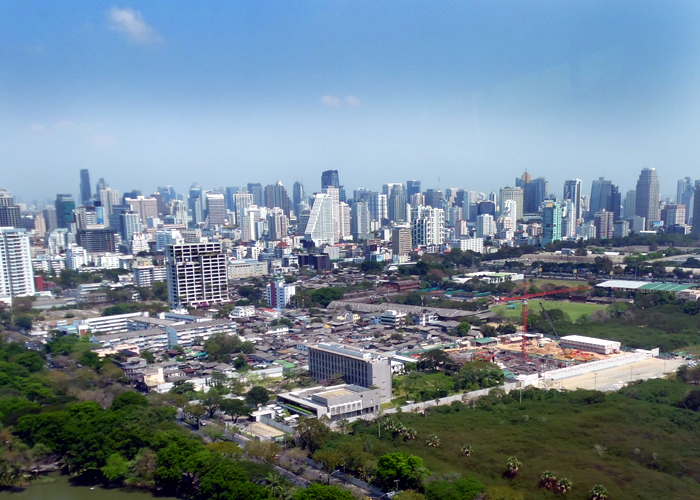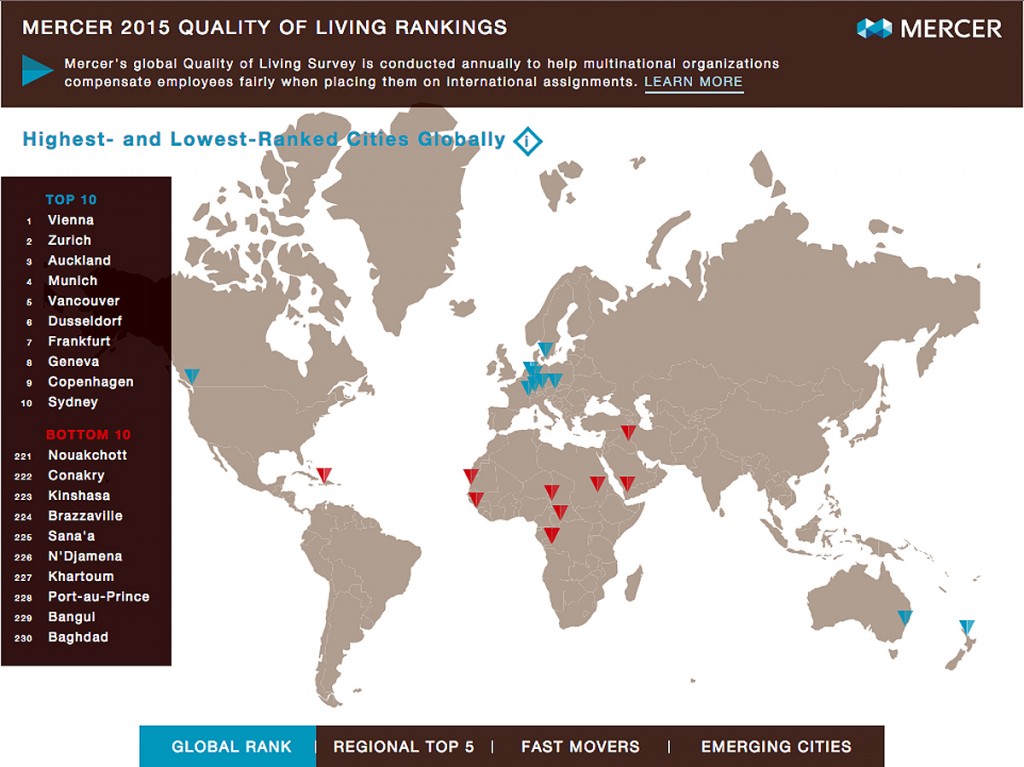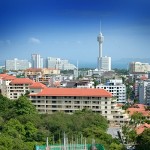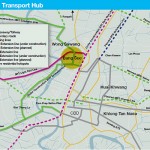Quality of life in Bangkok declined slightly in 2014, according to an annual survey that looks at more than 10 factors affecting the lives of expatriates around the world.
Bangkok was ranked in 117th place in an annual expatriate quality of living survey, while Singapore has been revealed as Asia’s top city in the Mercer 2015 Quality of Living list. The position puts the city ahead of Beijing and Rio De Janiero in 118th and 119th position respectively.
In 2014 the Thai capital was ranked in 115th place of 233 survey cities in the annual report, with its position remaining unchanged from 2014’s placing and having risen six places in 2012
Vienna once again topped the latest rankings and European cities dominated the top positions, and there are 12 Asia-Pacific cities in the top 50. Zurich, Auckland and Munich are in second, third, and fourth places respectively. Vancouver, in fifth place, is again the highest-ranking city in North America and the region’s only city in the top 10.
Singapore (26) is the highest-ranking Asian city, followed by Tokyo (44), Kobe (47) and Yokohama (48). In Greater China, Hong Kong (70), Taipei (83) and Taichung (99) all appear in the top 100.
Mercer conducts its Quality of Living survey annually to help multinational companies and other employers compensate employees fairly when placing them on international assignments. Employee incentives include a quality-of-living allowance and a mobility premium. Its reports provide information and hardship premium recommendations for more than 440 cities throughout the world; the ranking covers 230 of these cities.
Asia is the region with the largest range in quality-of-living standards, with the highest-ranking city, Singapore, in 25th place and the lowest-ranking, Dushanbe, Tajikistan, in 214th place.
Topping the ranking across East Asian cities is Tokyo in 44th place; Other key cities in this part of the region include Hong Kong (70), Seoul (72), Taipei (83), Shanghai (101), and Beijing (118).
Notable emerging cities in this part of Asia include Cheonan (98), South Korea, and Taichung (99) in Taiwan. Chinese cities Xi’an and Chongqing (both ranked 142nd) are also emerging as business destinations.
Their main challenges to improving quality-of-living standards are clean water provision and air pollution. However, advances in the telecommunications and consumer sectors have had some positive offsetting effects on their ranking.
Behind Singapore, the second highest-ranking city in Southeast Asia is Kuala Lumpur (84); other major cities include Manila (136), and Jakarta (140).
In South Asia, Colombo (132), ranks highest followed by emerging Indian cities Hyderabad (138) and Pune (145). Both cities rank higher for quality of living than the country’s more traditional business centres, Mumbai (152) and New Delhi (154). Considerable population increases in Mumbai and New Delhi in recent decades have increased existing problems, including access to clean water, air pollution, and traffic congestion.
“The survey results show that Asia-Pacific is a hugely diverse and dynamic region,” said Mario Ferraro, Global Mobility Leader for Asia, Middle East and Africa (AMEA) at Mercer.
“Within the same region there are some stark differences in quality of living, which organisations should take into account when deploying expatriates across borders.”
Ferraro added: “The assignment policies of some international businesses may be based on an assumption that Asia-Pacific is a homogeneous region, but this is certainly not the case. The picture is certainly not static either – a number of Asian cities are working hard to improve their reputation as locations of choice for foreign investment, including the quality of the living environment for expatriates. As well as the usual major cities, this year’s rankings include several new, emerging destinations for investment and talent in specific industries, such as IT, manufacturing and business services.”
Mercer evaluates local living conditions in more than 440 cities it surveys worldwide. Living conditions are analysed according to 39 factors, grouped in 10 categories including housing (rental housing, household appliances, furniture, maintenance services).
Andrew Batt, International Group Editor of PropertyGuru Group, wrote this story. To contact him about this or other stories email andrew@propertyguru.com.sg






